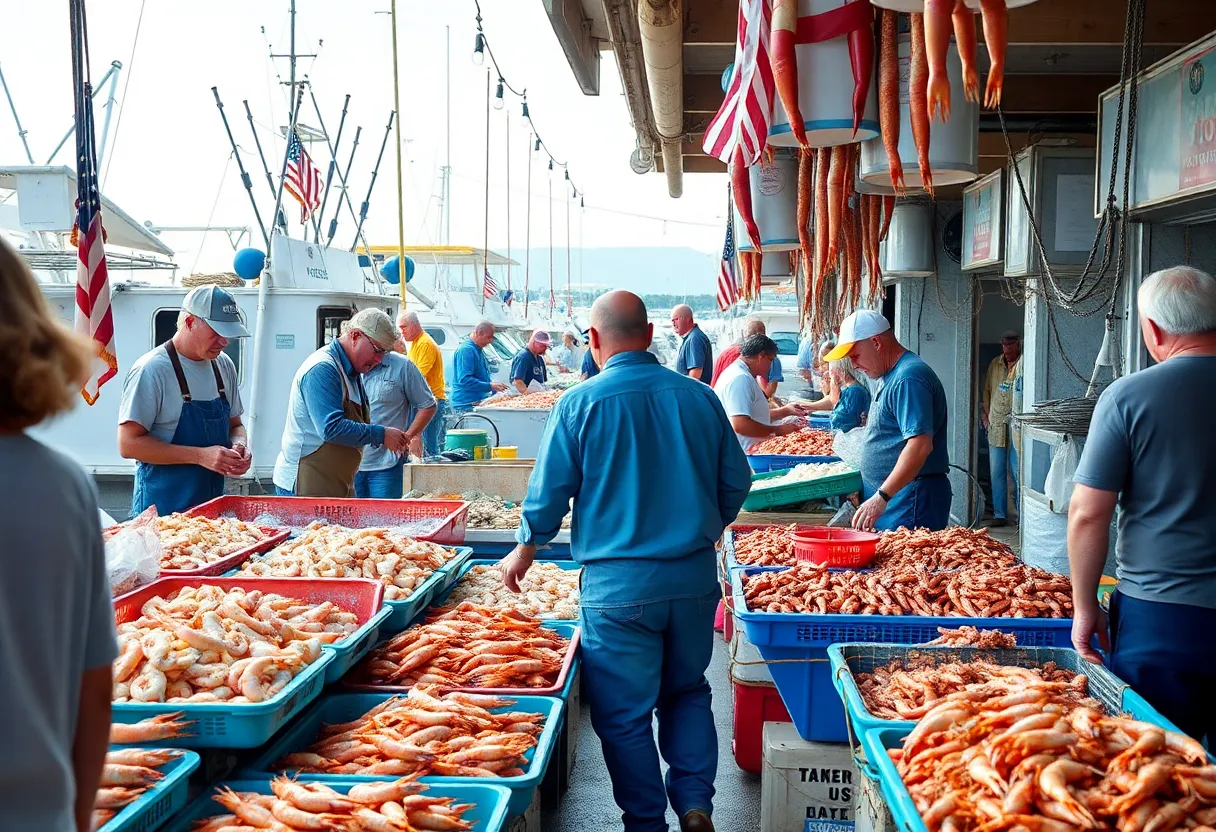

South Carolina Shrimp Market
In South Carolina, shrimpers like Craig Reaves are optimistic that new tariffs on imported shrimp will provide relief to the struggling local fishing industry. With 94% of shrimp consumed in the U.S. being imported, these tariffs could help revitalize local fisheries by confronting cheaper imports that undermine quality and value. Advocates stress the importance of supporting domestic shrimping to ensure food security and sustainable practices.
In the coastal heart of South Carolina, the shrimping community is abuzz with optimism as local business owners see a glimmer of hope on the horizon. Craig Reaves, the proud owner of CJ Seafood, believes the newly introduced tariffs on imported shrimp could serve as “immediate relief” for an industry that has faced significant challenges over the years. This region, known for its rich maritime heritage, has seen the shrimp industry struggle under the pressure of cheap imports that flood the market.
Reaves highlights a troubling trend: a staggering 94% of the shrimp consumed in the United States is imported. For far too long, local fishermen have felt the impact of competition from these international imports. As a generational fisherman, Reaves speaks passionately about how the U.S. fishery has been “crushed” by this relentless influx of lower-cost shrimp from places like Southeast Asia, Ecuador, India, and South America. These imports not only undermine local prices but also pose ethical questions regarding sourcing.
Delving into the heart of the matter, Reaves explains that the imported shrimp often comes from subpar conditions. This raises concerns about the environmental impact and the use of harmful substances, including irregular hormones and antibiotics that put both the ecosystem and consumer health at risk. In essence, while imported shrimp might come at a cheaper price, the saying goes, “Good seafood ain’t cheap, and cheap seafood ain’t good.” This stark contrast stands as a rallying call for local seafood advocates.
The current situation has created significant challenges for fulfilling domestic shrimp demands, particularly given the loss of crucial infrastructure that once supported thriving local fisheries. Reaves remains hopeful that the implementation of tariffs will be a stepping stone toward revitalizing the local shrimp industry. Although the road may be rocky at first, he believes the short-term pain could produce long-term gains for future generations of fishermen.
The Southern Shrimp Alliance has been vocal about this issue, emphasizing that the new tariffs are not just about protecting the shrimp industry but also about safeguarding American jobs and ensuring food security. The shifts in the market have been stark; since 2021, the U.S. shrimp industry has faced a nearly 50% drop in market value. Retail prices for shrimp continue to soar, which indicates a serious disconnect given that wholesale prices for imported shrimp have been declining.
In addition to market imbalances, the tariffs aim to confront practices deemed unfair, such as government subsidies for foreign aquaculture. Numerous labor issues in countries like India and Ecuador shed light on the troubling standards that many imported shrimp adhere to, which further complicate a level playing field for American seafood producers. Without addressing these challenges, experts warn that the U.S. could risk fully outsourcing its food supply, raising serious questions about food security and ethical production standards.
As the shrimping community rallies behind these developments, local voices like Reaves are reminding consumers about the importance of supporting domestic fishermen. By choosing locally-sourced shrimp, they can ensure that they are not just getting a tastier product, but also supporting family businesses with deep roots in their communities.
In a nutshell, the introduction of tariffs offers more than financial relief; it provides a chance to rebuild an industry that feeds families and sustains livelihoods. With each wave that crashes against the shore, the hope is that South Carolina’s shrimping industry can rise once again.
What Are the Best Practices for DIY Roof Winterization? Winter can pose serious threats to…
News Summary The South Carolina General Assembly has passed two contentious bills aimed at dismantling…
News Summary Hendrick Automotive Group has achieved the top ranking on the BNC 125 list,…
News Summary Residents of Myrtle Beach confront a dire situation as over 170 wildfires rage…
News Summary South Carolina and Canada celebrate a booming trade relationship, achieving a record $5…
News Summary Over the Easter weekend, severe storms ravaged Oklahoma, Texas, and Missouri, resulting in…